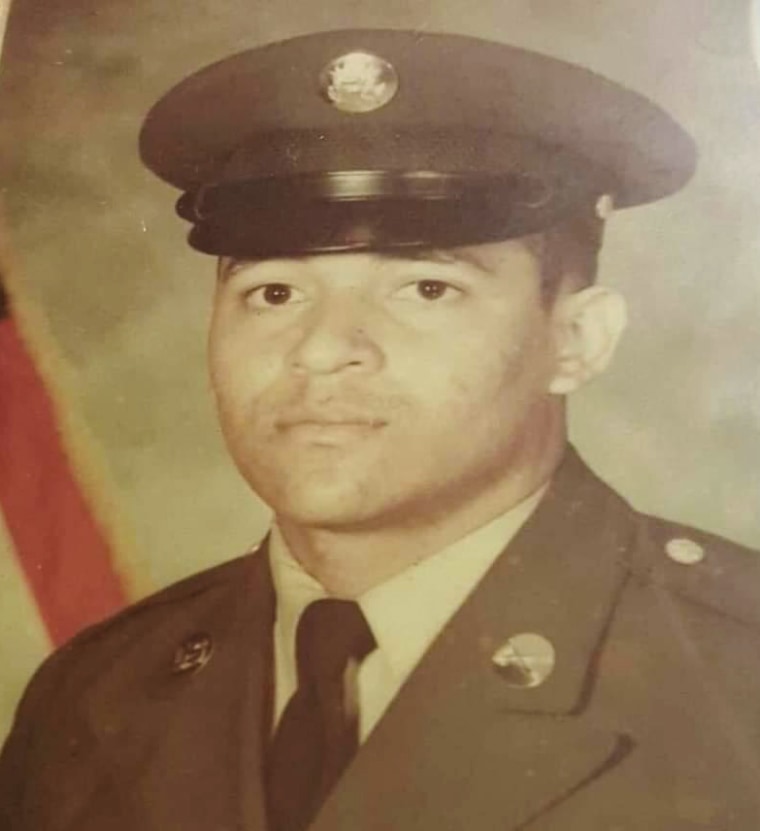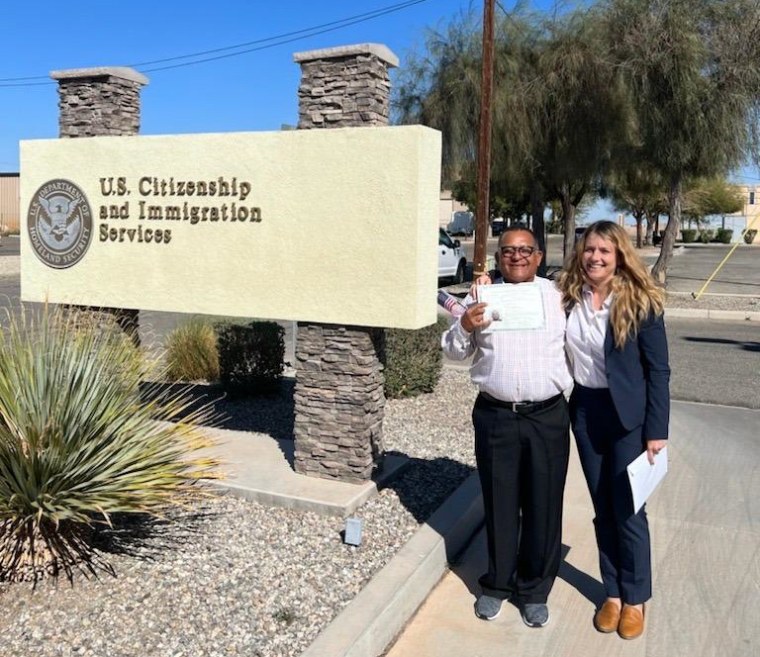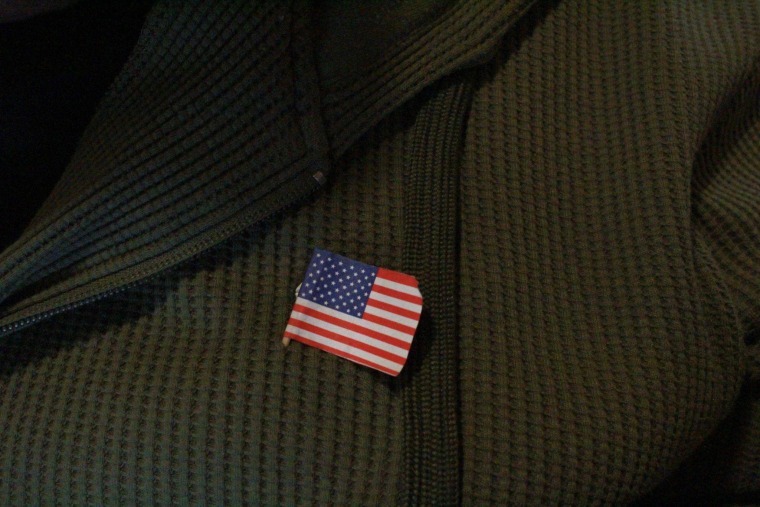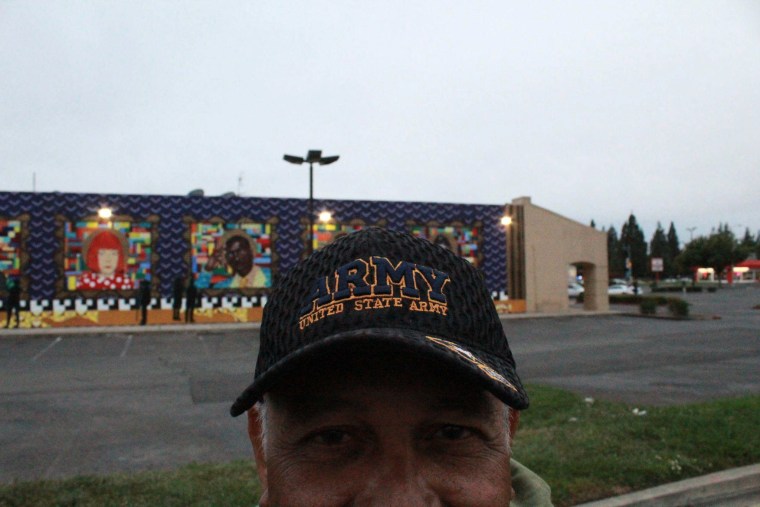SACRAMENTO, Calif. — Sitting across the restaurant table in Sacramento, Luis smiles when he sees his pancake stack holding a tiny American flag. It’s a commemoration to his service by the waiter who recognized Luis’ U.S. Army hat. Luis, in gratitude, pins the flag to his chest.
The U.S. Army veteran was deported to Nicaragua in the late 1990s after a drug-related conviction following years of drug abuse and arrests he attributes to his depression and PTSD. Now, Luis, 65, is eating his favorite breakfast meal again in California.
An unknown number of American military veterans remain in exile after their deportations from the U.S. But through a Biden administration effort announced a year ago, some deported veterans have been granted an opportunity to return to U.S. soil.
Luis, who is only being identified by his first name since he wants to protect his family's identity, was 20 years old when he swore to defend the U.S. Constitution against all enemies and to bear true faith and allegiance to this country. But little did he know that his experiences during his deployment overseas would upend his entire life.
'I didn’t know I suffered from PTSD'
Luis came to the U.S. when he was 15, part of an exodus following the devastating 6.2 magnitude earthquake in 1972 that destroyed the capital of Managua and left thousands dead.
He joined the rapidly growing Latin American community in California, specifically in Menlo Park, where his mother lived with a man who had fought in Vietnam. His American stepfather used to tell him stories about the war at dinnertime.
Luis quickly learned that he didn’t need to speak the language of the country to be willing to die for it. He heard from his high school friends that if he enlisted in the U.S. Army, he would secure a path to U.S. citizenship. After three months of basic combat training at Fort Sill in Lawton, Oklahoma, Luis was deployed to the Fort Kobbe Army Reservation on the west side of the Panama Canal in 1977.
“My job was to defend the Canal against any suspicious activities. When Jimmy Carter signed the treaties, we were prepared to respond just in case,” Luis said over coffee, referring to the Torrijos-Carter treaties, which established an end to the U.S. military presence there and gave Panama eventual control of the Canal after decades of tensions over the U.S. presence.
At age 20, Luis was a soldier, a husband and a father.
Now, sitting across the restaurant table, he's a grandfather. Over the years, his vision has deteriorated, forcing him to place the menu closer to his eyes. He reminds the waiter to speak louder, since his hearing is not as sharp as it was 25 years ago.
His memories, however, remain very vivid as he speaks softly, switching between English and Spanish with ease.

“There were a lot of things happening in Panama. There was a dictatorship,” he said. “The Panamanian government was against the American military presence. There were soldiers that experienced horrible things there.”
Luis said he was kidnapped and tortured by Panamanian authorities. That’s as far as he goes in describing an episode he wishes to erase but that his memory has preserved vividly. The end of his military service in Panama in June 1980 marked the beginning of nightmares that would follow him back to California.
“I didn’t know I suffered from PTSD. I was anxious. You get upset and then you are calmed. Later, you are desperate,” Luis said in Spanish, which he uses when he wants to ensure he’s fully understood.
For several years after he returned to the San Francisco Bay Area, Luis worked in a factory where he was responsible for packing boxes with Frito Lays bags. On a good day, he filled hundreds of boxes, each with 48 bags. On a bad day, just half of them. He increasingly found himself unable to concentrate.
When he got home, he couldn’t sleep. He feared being kidnapped and tortured again, despite the hundreds of miles separating him from Panama. Luis says he would wake up at night, sometimes at 2 a.m., sometimes at 4 a.m.
His sudden mood changes precipitated the separation from his then wife and their three little children. Luis eventually lost his job and could not pay rent on his own in San Jose.
It wasn’t until 1980, when Luis was already struggling with altered anxiety, that the American Psychiatric Association recognized PTSD as a mental health diagnosis. By the end of the decade, when Luis had succumbed to a cocaine addiction, Congress created the National Center for PTSD to address the mental health needs of veterans.
For Luis, the emotional state that came with consuming cocaine was a temporary relief — and a legal problem.
Luis was arrested several times for possession of illegal substances before being convicted in 1997 and incarcerated, first at Avenal State prison in Kings County and later transferred to the Donovan Correctional Facility in San Diego County. The solitude in a prison cell made the 16-month sentence feel like a longer punishment. He wanted his family back, but the government had different plans.
Once his sentence concluded, Luis was sent to an immigration jail less than 10 miles away from the U.S.-Mexico border, where he shared a dorm with dozens of other immigrant detainees, including fellow veterans.
“There was a Vietnam veteran fighting his case for three years. He was Mexican. Shortly after, he had a court appearance. [The judge] told him he was going to be deported,” Luis said. “I said to myself ‘if he went to Vietnam and was deported, why wouldn’t they deport me?’”
“I went to my court date and told the judge, ‘where do I sign?’” Luis said, referring to his own deportation order, assuming he was going to be expelled from the U.S.
'Deported vet here. I salute you.'
In 1996, President Bill Clinton, a Democrat, signed the Illegal Reform and Immigrant Responsibility Act (IRIRA), a law that dramatically expanded the number of noncitizens, including permanent residents like Luis, who could be deported.
The 1996 law broadened the categories of criminal convictions that could make immigrants deportable, adding certain misdemeanors and nonviolent offenses to the list. Luis’ 1997 conviction for possession of a controlled substance, a misdemeanor under California law, was suddenly sufficient grounds for the government to order his deportation to Nicaragua. The law did not consider his military service.
NBC News asked the U.S. Department of Homeland Security (DHS) to provide the total number of U.S. military veterans who have been deported since 1996, but did not receive the requested data. A 2019 report by the Government Accountability Office, a congressional investigative agency, found that DHS did not properly track cases of veterans it deported or placed in deportation proceedings.
Luis arrived in his native country at the dawn of a new millennium. The capital of Managua wasn’t in ruins, as it was when he left more than two decades prior. But the country’s socioeconomic conditions, he said, endured: access to basic services like health care and employment were limited, problems that continue to make Nicaragua one of Latin America’s least developed nations, according to the World Bank.
During the next two years in Nicaragua, Luis stayed with relatives, sleeping in couches while struggling with an undiagnosed PTSD. The little money he made from construction jobs wasn’t enough to live on his own. Unable to find work in Managua, Luis wondered where he could make better use of his bilingual skills. The answer was Mexico.
In Puerto Madero, on the south side of Chiapas, Luis drove tourists along the Pacific coast. In Mazatlán, a commercial seaport in Sinaloa, Luis fished shrimp for five years. In Los Cabos, he worked in the booming tourism industry which has converted Baja California into a popular destination today. But it was in Puerto Vallarta, in the state of Jalisco, where Luis found some economic stability, offering tours of the boardwalk to American visitors.
Money, however, did not erase the nightmares that kept following him. Year after year, those nightmares became Luis’ life sentence.
In the middle of a September night in 2018, Luis typed "veteranos deportados," or deported veterans in Spanish, on the Facebook search bar. Among the many groups he found, there was one called the Brotherhood of Deported Veterans, which listed Albert Knox as its founder.
Nine minutes before 10 p.m., Luis messaged Knox, “deported vet here. I salute you.”
Didn't 'deserve to get back to the U.S. in a coffin'
Albert Knox’s real name is Juan Martinez. Unlike Luis, he was born in Mexico in 1979. The age difference between them determined the period of hostilities they served in, but one event bonded them like brothers in arms: their deportation from the U.S.
More than a decade after his arrest and incarceration due to a drug offense in California — which led to his deportation — Martinez heard about other deported veterans living near the U.S.-Mexico border in Tijuana. Wondering if there were any former U.S. service members residing in Central Mexico, Martinez created in 2019 a Facebook group called Brotherhood of Deported Veterans, whose membership has grown from six to 100 veterans to date.
Deported veterans remain eligible for government benefits afforded to those who serve in uniform, but they cannot access Department of Veteran Affairs services because their deportations prevent them from returning to the U.S. It fell to people like Martinez, who is currently starting the process to reunite with his family in Bakersfield, to help them access preventative and mental health care in Mexico.
“When Luis first contacted me, he told me it was hard for him to get around. I didn’t want to see him dying here. He didn’t deserve to get back to the U.S. in a coffin," said Martinez during an interview from his house in Guanajuato, Mexico, 24 years after his service in Operation Desert Thunder in Kuwait.
"We started looking into his case and got him a couple of lawyers. In fact, I accompanied him to Mexico City to get fingerprints and photographs,” Martinez said.
Immigrant service members who served honorably during designated periods of hostilities may be eligible to become U.S. citizens. Luis was eligible because he served in Panama within the Vietnam hostilities time frame between Feb. 28, 1961 and Oct. 15, 1978.
But even if deported veterans satisfy the preliminary citizenship requirements, they often struggle to receive parole, or legal authorization to re-enter the U.S., so they can attend their U.S. Citizenship and Immigration Services (USCIS) interviews.
Amanda Schuft, directing attorney at the Immigrant Defenders Law Center, a firm that has represented Luis and at least 30 other deported veterans, said Luis’ first citizenship appointment was delayed because his parole request was not adjudicated in time.

After years of waiting, Luis walked through the San Ysidro border crossing in southern California this March, stepping on U.S. soil for the first time in over two decades. He hugged his children and grandchildren. But there was one more objective he aspired to accomplish: taking the oath of allegiance.
“I’ve cried over sadness before and problems I had in my life, but crying over happiness? That was the first time," Luis said, referring to the morning of March 11, 2022, when he was sworn in as a U.S. citizen. "You enjoy it more when you cry over happiness."
Thinking that his military service was an act of American patriotism, Luis said he did not feel the need to pursue the naturalization process during his time in the Army. Supervisors didn’t bring it up either.
Last month, however, the Department of Veteran Affairs began contacting thousands of immigrant military veterans as part of a Biden administration push to urge more of them to become U.S. citizens and help others who had been deported.
In June, Immigration and Customs Enforcement (ICE) instructed agents to affirmatively ask immigrants about any military service and to consider it when deciding whether to place them in deportation proceedings, a policy shift that could have changed the course of Luis’ life.

Asked if he can finally sleep through the night, now that he is a U.S. citizen, Luis answers quickly, without hesitation.
“No," he said. "I wake up daily, sometimes every hour, every two hours. Your entire body sweats. The flashbacks. I kneel down and I ask God for help. Sometimes what medicine can’t cure, God does.”
Follow NBC Latino on Facebook, Twitter and Instagram.
